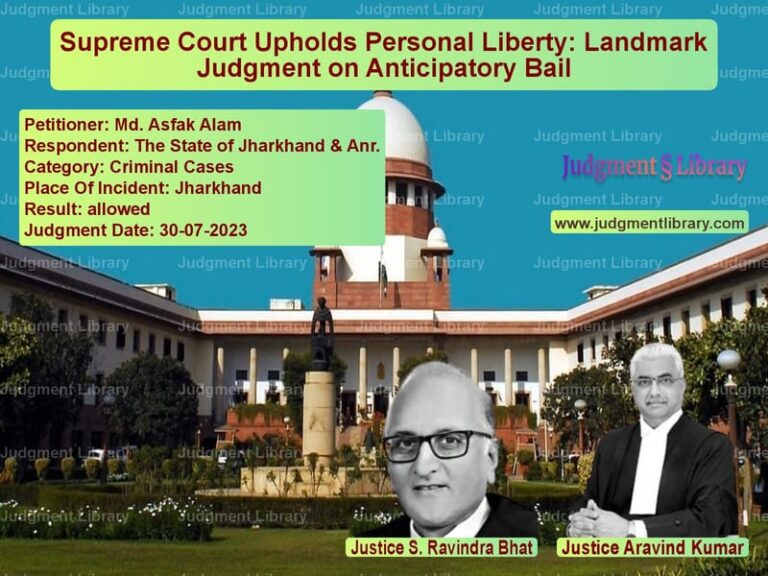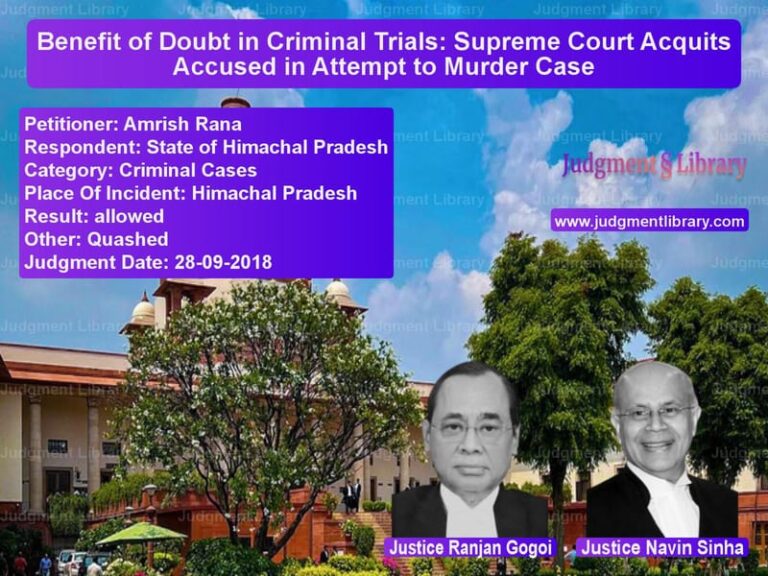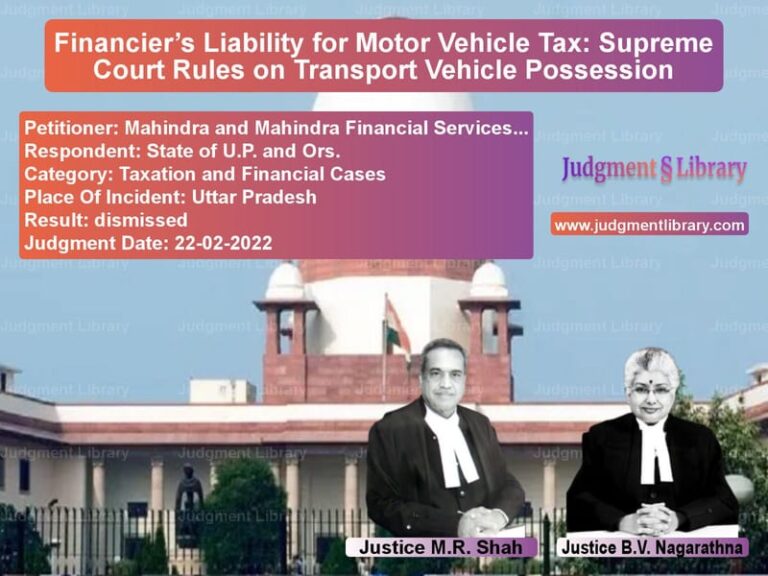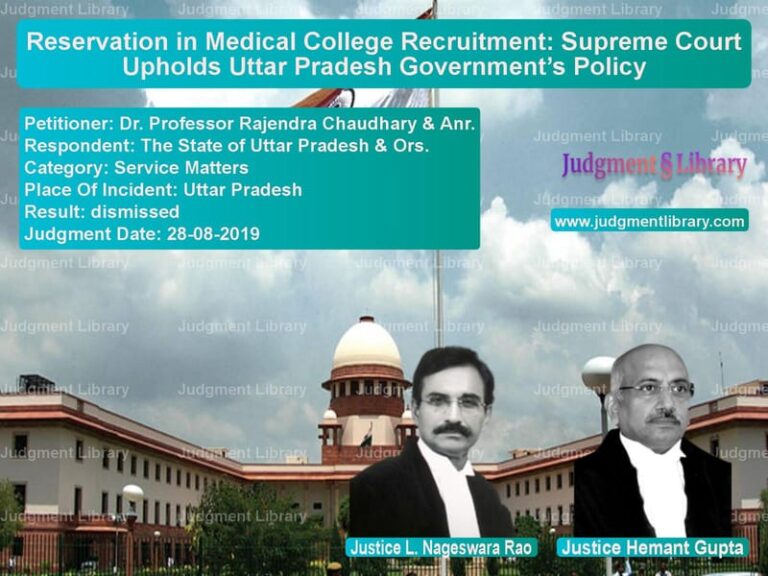Disciplinary Proceedings Quashed: Supreme Court Rules in Favor of Uttar Pradesh Tax Officer
In a significant ruling, the Supreme Court of India overturned a disciplinary penalty imposed on an Uttar Pradesh tax officer, reinforcing the importance of procedural fairness in departmental inquiries. The case, Satyendra Singh vs. State of Uttar Pradesh & Anr., involved allegations of misconduct against an Assistant Commissioner of Commercial Tax and the subsequent disciplinary proceedings that led to a major penalty. The Supreme Court ruled that the inquiry process was flawed, as no witnesses were examined to substantiate the charges.
Background of the Case
The appellant, Satyendra Singh, was serving as Assistant Commissioner, Commercial Tax, in Ghaziabad when disciplinary proceedings were initiated against him in 2012. A charge sheet was issued on March 5, 2012, and an Inquiry Officer conducted the proceedings. The Inquiry Report was submitted on November 29, 2012. The Disciplinary Authority reviewed the report and, on November 5, 2014, imposed the following penalties:
- Censure Entry
- Stoppage of two-grade increments with cumulative effect
Singh challenged this decision before the State Public Services Tribunal, Lucknow, which ruled in his favor on June 5, 2015. The Tribunal found that the disciplinary proceedings were unfair and lacked proper evidence, ordering the quashing of the penalty. The Uttar Pradesh government then challenged this order in the Allahabad High Court, which reversed the Tribunal’s decision on July 30, 2018. This led Singh to appeal to the Supreme Court.
Arguments of the Parties
Arguments by the Appellant (Satyendra Singh)
The appellant’s counsel argued that the entire disciplinary process violated the Uttar Pradesh Government Servant (Discipline and Appeal) Rules, 1999. Key points included:
- No witnesses were examined to prove the charges against him.
- The inquiry officer relied solely on documentary evidence without substantiating it through oral testimony.
- Rule 7 of the 1999 Rules mandates that an Inquiry Officer must record oral evidence and allow cross-examination of witnesses, which was not followed.
- The Tribunal had correctly recognized these procedural flaws and quashed the penalty.
Arguments by the Respondents (State of Uttar Pradesh)
The state defended the disciplinary action, arguing:
- The appellant had not adequately challenged the findings of the Inquiry Officer.
- The Disciplinary Authority had reviewed the case thoroughly before imposing the penalty.
- The High Court’s judgment was correct in reinstating the penalty.
Supreme Court’s Observations and Judgment
The Supreme Court scrutinized the disciplinary proceedings and found several key issues:
- The penalty imposed on Singh was a major penalty under the 1999 Rules.
- Rule 7 mandates that in cases involving a major penalty, the Inquiry Officer must call witnesses and allow cross-examination. This was not done.
- The Inquiry Report merely referred to documents but failed to provide witness testimony, making it legally insufficient.
- Similar procedural lapses had been addressed in prior Supreme Court rulings, such as Roop Singh Negi v. Punjab National Bank and Nirmala J. Jhala v. State of Gujarat.
In its judgment, the Supreme Court ruled:
“The inquiry proceedings conducted against the appellant pertaining to charges punishable with major penalty, were totally vitiated and non-est in the eyes of law since no oral evidence whatsoever was recorded by the department in support of the charges.”
The Court concluded that the High Court had erred in reinstating the penalty and reinstated the Tribunal’s order.
Impact of the Judgment
This ruling is a landmark decision reinforcing the importance of fair procedures in departmental inquiries. Key takeaways include:
- Reaffirmation of due process: Government employees cannot be penalized without proper evidentiary procedures.
- Strict adherence to inquiry rules: Departments must follow prescribed rules for disciplinary actions, including witness examination.
- Protection against arbitrary penalties: Employees have legal recourse if due process is not followed in disciplinary cases.
Conclusion
The Supreme Court’s decision in Satyendra Singh vs. State of Uttar Pradesh sets an important precedent in service law. By quashing the flawed disciplinary proceedings, the Court has upheld the principles of natural justice and procedural fairness. This case serves as a reminder to government authorities to strictly follow established disciplinary procedures before imposing penalties on employees.
Petitioner Name: Satyendra Singh.Respondent Name: State of Uttar Pradesh & Anr..Judgment By: Justice Pamidighantam Sri Narasimha, Justice Sandeep Mehta.Place Of Incident: Uttar Pradesh.Judgment Date: 17-11-2024.
Don’t miss out on the full details! Download the complete judgment in PDF format below and gain valuable insights instantly!
Download Judgment: satyendra-singh-vs-state-of-uttar-prade-supreme-court-of-india-judgment-dated-17-11-2024.pdf
Directly Download Judgment: Directly download this Judgment
See all petitions in Disciplinary Proceedings
See all petitions in Public Sector Employees
See all petitions in Termination Cases
See all petitions in Judgment by P.S. Narasimha
See all petitions in Judgment by Sandeep Mehta
See all petitions in allowed
See all petitions in supreme court of India judgments November 2024
See all petitions in 2024 judgments
See all posts in Service Matters Category
See all allowed petitions in Service Matters Category
See all Dismissed petitions in Service Matters Category
See all partially allowed petitions in Service Matters Category







